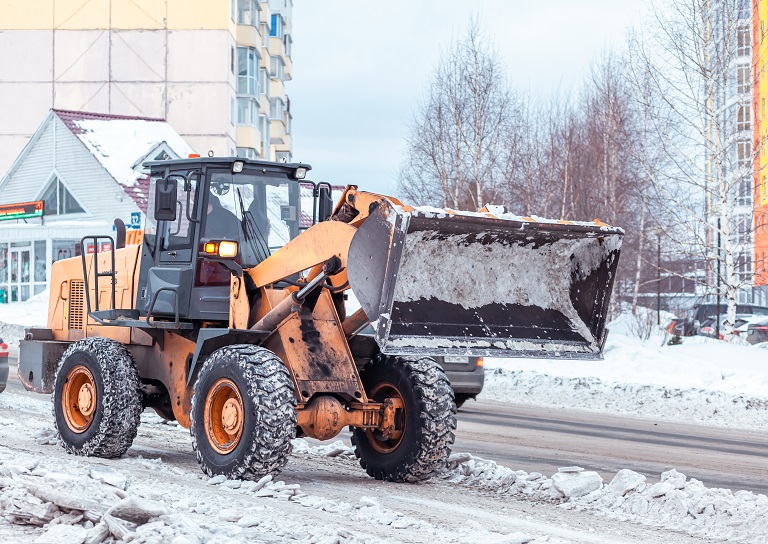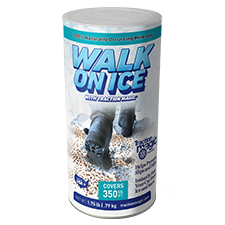Is Your Ice Melt Safe For Asphalt? Checklist Inside

Ice melt comes really handy in the winter to keep your property safe during snowstorms and ice storms. However, not all ice melts are effective. In this article, we’ll discuss the best ice melt for asphalt driveways.
Today, I’ll reveal why sodium chloride (often called rock salt) is not the best choice for your asphalt driveway. Plus, an alternative that works better and won’t damage your blacktop.
The dangers of chloride for asphalt driveway
Chloride is a chemical that can damage your asphalt driveway. The problem with chloride is that it causes corrosion to the asphalt, which leads it to break down and eventually crack. Over time, the cracks get bigger and bigger until the driveway has crumbled away completely.
Chloride can also be dangerous for pets if they drink it or eat it off of the ground where you’ve spread the chloride-based ice melt. This can cause serious illness in dogs and cats because their bodies cannot handle chloride like us.

Here’s the checklist to help you choose the best ice melt for asphalt and concrete:
Avoid Calcium Chloride And Magnesium Chloride
While it may seem like a good idea to use ice melt on your driveway and parking lot, avoid using chemical ice melts for several reasons.
- Chloride salts can damage asphalt surfaces by increasing their brittleness, leading to cracks and ruts in the pavement.
- Calcium chloride and magnesium chloride are corrosive to any blacktop surface.
Safety Of Kids, Pets, And Environment
Salt can also cause other problems, like corrosion in the pipes that run under your driveway. Rock salt is not safe for pets also. If you have plants where you drive, rock salt is also bad for them since it can kill plant roots if they come into contact with it often enough.
Choose The Best Ice Melt For Asphalt Driveway
Safe Thaw is a unique, environmentally friendly, and effective ice melt approved for use on all driveway surfaces. It doesn’t negatively impact the life of your asphalt and concrete driveway. Moreover, the product has no harmful effects on plants or animals, including pets and wildlife.
Safe Thaw doesn’t pollute groundwater either. It is safe to use around any water source. Safe Thaw contains special surfactants & ice melting boosters. It helps keep your driveway free from slippery ice layers even at very low temperatures and prevents unwanted slip accidents.
Comparing Asphalt vs Blacktop Cost In Winter Maintenance
People often ask if there’s any real difference between asphalt and blacktop when considering installation and maintenance costs. At their core, both are mixtures of bitumen and aggregates, but blacktop tends to have a slightly different ratio, giving it a smoother finish. When winter comes into the picture, the asphalt vs blacktop cost comparison gets more interesting.
Asphalt driveways, depending on region, usually cost between $3 to $7 per square foot, while blacktop driveways may come in slightly lower upfront due to the blend used. But the real cost isn’t just in laying it down—it’s in how you maintain it during freeze-thaw cycles. If you apply chloride-based ice melts, you’ll face cracking, raveling, and eventually resurfacing bills that can climb into the thousands. That’s why choosing the best ice melt for asphalt isn’t just a winter decision—it’s a financial one.
So, while asphalt might last 20–30 years and blacktop closer to 15–20, improper ice management can slash those numbers dramatically. Spending a little more now on chloride-free, concrete- and asphalt-safe products protects your surface and extends its life, ultimately lowering the long-term cost equation.
Homemade Ice Melt And Asphalt: Helpful Or Harmful?
With growing awareness around eco-friendly living, many people try homemade ice melt recipes. Vinegar, rubbing alcohol, dish soap mixes, or even beet juice often make the rounds online as “natural alternatives.” But here’s where you need to pause.
While these mixtures can sometimes help lower freezing points temporarily, they’re not always friendly to your asphalt. Vinegar, being acidic, can erode surface sealants. Alcohol-based mixtures evaporate quickly, offering only short-lived relief. And while beet juice solutions are praised for environmental friendliness, they tend to stain surfaces and can attract unwanted pests.
In fact, repeated use of DIY ice melt solutions can weaken the protective oils in asphalt, leaving it brittle over time. This is one of the most overlooked aspects of winter care. So, while homemade deicers might sound appealing, they’re not always the best choice for preserving your driveway. Industrial-grade, chloride-free ice melt products remain the safer, more reliable solution.
Can I Use Hot Water To Melt Ice On Driveway?
Another common winter hack you might have heard is pouring hot water directly onto your icy driveway. It seems logical—ice melts with heat, right? But here’s the catch: the moment boiling or hot water hits freezing temperatures, it refreezes, often faster than you expect. This leads to a sheet of black ice, making the surface even more hazardous.
So, when you ask, “Can I use hot water to melt ice on driveway?” the practical answer is no. You might end up creating a skating rink instead of clearing the surface. If you’re tempted to try it, you’d need to follow it immediately with a non-corrosive ice melt to prevent refreezing—but at that point, it’s safer to skip the hot water step altogether.
100% salt & chloride-free, fast acting Ice Management Solution
Dealing With Stains: The Best Oil Stain Remover For Asphalt Driveway
Even when ice melt is handled correctly, asphalt driveways often face another challenge—oil stains. Cars leak, trucks drip, and before you know it, dark patches set into your blacktop. This is where the best oil stain remover for asphalt driveway becomes a necessity.
Unlike concrete, asphalt is porous and darker in color, so stains can blend in yet weaken the surface integrity. Traditional degreasers sometimes work, but if they’re too harsh, they can strip the natural oils in asphalt, leaving it prone to cracking. Specialized asphalt-safe oil stain removers not only lift the stain but also protect the binding agents within the driveway. For long-term care, it’s a good idea to clean up oil spots immediately and reapply sealcoat every few years. Combining that with chloride-free ice melt keeps your asphalt looking and performing its best all year.
Conclusion
Protecting asphalt isn’t just about choosing the right ice melt—it’s about making smart choices across the board. From understanding the asphalt vs blacktop cost equation to avoiding risky shortcuts like homemade ice melt or pouring hot water on your driveway, each decision adds up to either extending or shortening the life of your surface. And when stains do appear, having the best oil stain remover for asphalt driveway at hand ensures they don’t compromise the structure further.
Above all, the key lies in prevention. Using harsh salts like calcium chloride or sodium chloride may seem cost-effective in the moment, but the long-term damage far outweighs the short-term benefits. For industrial spaces, commercial complexes, government facilities, and large-scale properties, choosing a chloride-free, non-corrosive solution like Safe Thaw makes practical and financial sense. Not only does it melt ice effectively at low temperatures, but it also safeguards asphalt, concrete, and surrounding vegetation—delivering true value in the harshest winter conditions.
By thinking beyond quick fixes and prioritizing long-term care, you can ensure that your asphalt driveway or blacktop investment remains safe, durable, and cost-efficient for decades.
Try Also Our Other Winter Safety Products:
Safe Paw
The Original and #1 Selling Pet and Child Safe Ice Melt for over 20 years. Guaranteed environmentally safe –It won’t harm animals or children, and it won’t damage your property. That’s Safe Paw. Safe Paw can change how winter affects our planet.

Walk On Ice
Prevent slips at home, work or on the go, The handy disposable canister can be taken everywhere, with the same 100% naturally occurring minerals that provide instant traction on ice or snow. Use it on sidewalks, steps, or as an instant traction agent for your car.


